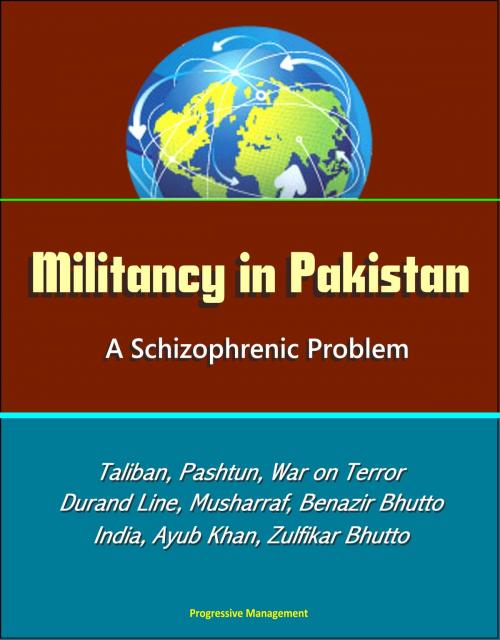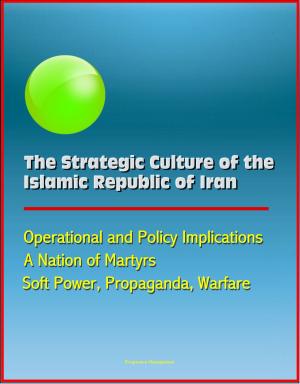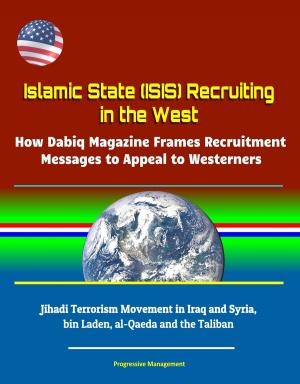Militancy in Pakistan: A Schizophrenic Problem - Taliban, Pashtun, War on Terror, Durand Line, Musharraf, Benazir Bhutto, Zia Al-Huq, India, Ayub Khan, Zulfikar Bhutto
Nonfiction, History, Asian, India| Author: | Progressive Management | ISBN: | 9781311534767 |
| Publisher: | Progressive Management | Publication: | July 2, 2014 |
| Imprint: | Smashwords Edition | Language: | English |
| Author: | Progressive Management |
| ISBN: | 9781311534767 |
| Publisher: | Progressive Management |
| Publication: | July 2, 2014 |
| Imprint: | Smashwords Edition |
| Language: | English |
Since 2001, the West has focused on the insurgency along the Afghan-Pakistani border. The minimal achievements of Pakistan's counterinsurgency operations drew U.S. scrutiny. Skeptics accused Pakistan of not being serious about eliminating Islamic militants. Pakistan has opposed, supported, or ignored Islamic militant groups. Both domestic and transnational issues complicate Islamabad's decision-making ability. This study evaluates to what extent India, Islamic affinity, and Pashtun nationalism shaped Pakistan's counterinsurgency strategy. The perceived existential Indian threat creates a security dilemma for the Pakistani military. Pakistan lacks the capacity to fight a two-front war without international assistance. Islamabad's instrumental use of Islamic groups to achieve political and strategic objectives allows Islamist to become intertwined with the state. Strategic successes of the military-militant nexus created deep-rooted sympathies toward Islamic militants that make implementing counterinsurgency policies problematic. Fearing Pashtun nationalism, the Pakistan army's deployment in the region was minimal, and instead, Pashtun tribal leaders were unprotected against radical elements. The Mullahs' growing strength upset the balance of authority within the tribal governance system. The spread of radical fundamentalism outside the FATA region forced Islamabad to react.
CHAPTER I - INTRODUCTION * A. MAJOR RESEARCH QUESTION * B. IMPORTANCE * C. PROBLEMS AND HYPOTHESES * D. LITERATURE REVIEW * E. METHODS AND SOURCES * F. THESIS OVERVIEW * CHAPTER II - IS INDIA A CREDIBLE THREAT? * A. INTRODUCTION * B. OPPOSING ARMIES * 1. Conventional Forces in Comparison * 2. Marginalized Paramilitary Force * 3. Pakistani Armies Conventional Training * C. MILITARY EXPENDITURES * D. HONORING THE CONVENTIONAL THREAT * E. WILL WASHINGTON ABANDON PAKISTAN? * F. CONCLUSION * CHAPTER III - A SELECTIVE ISLAMIC AFFINITY * A. INTRODUCTION * B. JIHADI RHETORIC * C. PROSCRIBING MILITANT GROUPS * D. POLITICAL COLLUSION * E. THE MILITARY IS NOT MONOLITHIC * F. ISLAMIC GROUPS CHALLENGE THE STATE * G. CONCLUSION * CHAPTER IV - PASHTUN NATIONALISM POST-9/11 * A. INTRODUCTION * B. WHO ARE THE PASHTUNS? * C. WHAT IT IS PASHTUN NATIONALISM? * 1. Durand Line * 2. Pashtunistan * 3. Afghan Factor * D. FAILED GOVERNANCE * E. CONTAINING THE THREAT * F. TALIBANIZATION * G. CONCLUSION * V. CONCLUSION * A. AN INDIAN NEIGHBOR * B. ISLAMIC AFFINITY * C. PASHTUN NATIONALISM
Pakistan has been using Islamic militant groups as a foreign policy tool against Afghanistan and India over the past sixty years; however, the events of 9/11 created a paradigm shift on the way Pakistan dealt with such groups. The context in which militant groups operating within Pakistan has been affected by Islamabad's enhanced friendship with Washington. With over 24 different domestic and transnational militant groups identified within Pakistan, the Pakistani government has supported, ignored, or opposed militant groups. With multiple militant groups with varying objectives operating within Pakistan, it would take considerable research to answer that problem in its entirety. Isolating the problem to a particular region narrows the focus of the overall problem. The research is concentrated on the Khyber Pakhtunkhwa, which harbors the greatest population of Islamic militant groups oriented toward Afghanistan and Pakistan. Although President Musharraf quickly joined the United States' "War on Terror," Pakistan has been reluctant to conduct counterinsurgency operations to stymie cross-border militant activity along the Afghan-Pakistani border, which has increased U.S. skepticism toward Pakistan. Pakistan has been placed in a precarious position by garnering substantial aid from the United States in exchange for assistance in building Afghan security.
Since 2001, the West has focused on the insurgency along the Afghan-Pakistani border. The minimal achievements of Pakistan's counterinsurgency operations drew U.S. scrutiny. Skeptics accused Pakistan of not being serious about eliminating Islamic militants. Pakistan has opposed, supported, or ignored Islamic militant groups. Both domestic and transnational issues complicate Islamabad's decision-making ability. This study evaluates to what extent India, Islamic affinity, and Pashtun nationalism shaped Pakistan's counterinsurgency strategy. The perceived existential Indian threat creates a security dilemma for the Pakistani military. Pakistan lacks the capacity to fight a two-front war without international assistance. Islamabad's instrumental use of Islamic groups to achieve political and strategic objectives allows Islamist to become intertwined with the state. Strategic successes of the military-militant nexus created deep-rooted sympathies toward Islamic militants that make implementing counterinsurgency policies problematic. Fearing Pashtun nationalism, the Pakistan army's deployment in the region was minimal, and instead, Pashtun tribal leaders were unprotected against radical elements. The Mullahs' growing strength upset the balance of authority within the tribal governance system. The spread of radical fundamentalism outside the FATA region forced Islamabad to react.
CHAPTER I - INTRODUCTION * A. MAJOR RESEARCH QUESTION * B. IMPORTANCE * C. PROBLEMS AND HYPOTHESES * D. LITERATURE REVIEW * E. METHODS AND SOURCES * F. THESIS OVERVIEW * CHAPTER II - IS INDIA A CREDIBLE THREAT? * A. INTRODUCTION * B. OPPOSING ARMIES * 1. Conventional Forces in Comparison * 2. Marginalized Paramilitary Force * 3. Pakistani Armies Conventional Training * C. MILITARY EXPENDITURES * D. HONORING THE CONVENTIONAL THREAT * E. WILL WASHINGTON ABANDON PAKISTAN? * F. CONCLUSION * CHAPTER III - A SELECTIVE ISLAMIC AFFINITY * A. INTRODUCTION * B. JIHADI RHETORIC * C. PROSCRIBING MILITANT GROUPS * D. POLITICAL COLLUSION * E. THE MILITARY IS NOT MONOLITHIC * F. ISLAMIC GROUPS CHALLENGE THE STATE * G. CONCLUSION * CHAPTER IV - PASHTUN NATIONALISM POST-9/11 * A. INTRODUCTION * B. WHO ARE THE PASHTUNS? * C. WHAT IT IS PASHTUN NATIONALISM? * 1. Durand Line * 2. Pashtunistan * 3. Afghan Factor * D. FAILED GOVERNANCE * E. CONTAINING THE THREAT * F. TALIBANIZATION * G. CONCLUSION * V. CONCLUSION * A. AN INDIAN NEIGHBOR * B. ISLAMIC AFFINITY * C. PASHTUN NATIONALISM
Pakistan has been using Islamic militant groups as a foreign policy tool against Afghanistan and India over the past sixty years; however, the events of 9/11 created a paradigm shift on the way Pakistan dealt with such groups. The context in which militant groups operating within Pakistan has been affected by Islamabad's enhanced friendship with Washington. With over 24 different domestic and transnational militant groups identified within Pakistan, the Pakistani government has supported, ignored, or opposed militant groups. With multiple militant groups with varying objectives operating within Pakistan, it would take considerable research to answer that problem in its entirety. Isolating the problem to a particular region narrows the focus of the overall problem. The research is concentrated on the Khyber Pakhtunkhwa, which harbors the greatest population of Islamic militant groups oriented toward Afghanistan and Pakistan. Although President Musharraf quickly joined the United States' "War on Terror," Pakistan has been reluctant to conduct counterinsurgency operations to stymie cross-border militant activity along the Afghan-Pakistani border, which has increased U.S. skepticism toward Pakistan. Pakistan has been placed in a precarious position by garnering substantial aid from the United States in exchange for assistance in building Afghan security.















